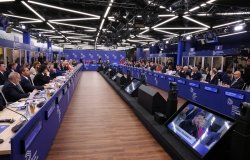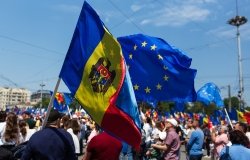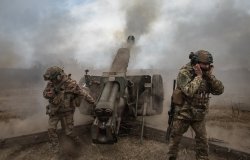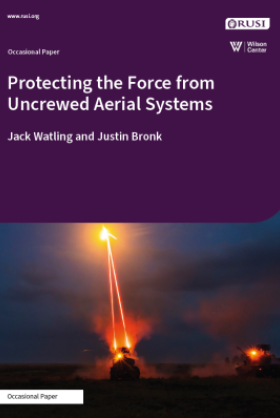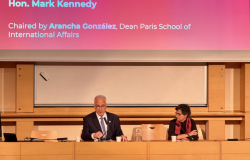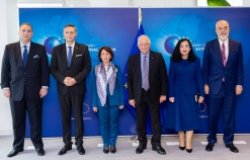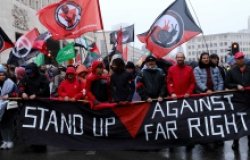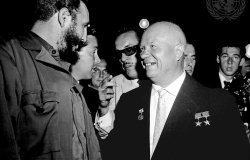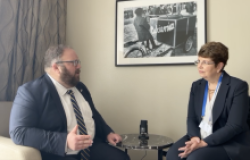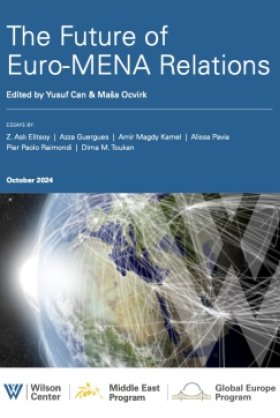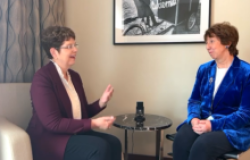247. Romania's Return to its Western Identity: Internal Reforms and International Security Contribution
Thank you, Director Hamilton, for your kind words.
Ladies and Gentlemen, it is a great pleasure for me to address you at this highly respected institution that bears the name of Woodrow Wilson. Wilson was a visionary American President, actively involved in building modern Europe. His principles and actions, which inspired so many American and European leaders, have shaped Europe's Western identity and the identity of my own country as a part of Modern Europe.
Romania's Western Identity
Geographically, Romania lays in Central Europe, equidistant between the Atlantic and Urals Mountains. Our Latin language and cultural heritage - connected to the Mediterranean civilization, with ancient Greece and Rome - are part of Europe. Our political and intellectual elite, educated in the 19th and early 20th centuries in Paris, Berlin, Vienna or Rome, always defined their identity with reference to the values, ideas and developments of Western Europe.
The birth of the American democracy, the French Revolution, the Enlightenment and the entire democratic evolution of the West have inspired and energized Romanian society. I can mention there were significant historical events in my country, such as the Revolution of 1848, the birth of the Romanian modern state in 1859 on the basis of the unification of two historical provinces - Moldova and Valachia, the Independence War against Ottoman Empire in 1877. The Great Union of all Romanian provinces in 1918 was a result of the fall of Austro-Hungarian and Tsarist Empires, and a materialization of Wilson's principle of self-determination of nations.
All these events find their philosophical underpinnings in the liberal revolution in the West. The adoption of the first modern Romanian Constitution in 1923 provided for a multi-party political system, separation of powers and universal vote. The Romanian cultural avant-garde, including Brancusi, Enescu, Ionesco, has studied and performed in Western Europe and the United States. They were inspired by the Western culture and contributed to it as well. During the second half of the twentieth century, the Soviet occupation cruelly diverted my country from its natural evolution as European State. The conference of Yalta divided Europe, and the Soviet Union seized the opportunity and completed the task.
There were moments during the Soviet domination when ideals, associated with fundamental freedoms and Western identity, influenced our worldview. In the late 1950s and 1960s, Romania was the first country in the Soviet bloc to develop economic, technological and cultural relations with Western countries and to establish diplomatic relations with Western Germany. In 1967, we also were the only "Eastern bloc" country to maintain diplomatic relations with Israel. In 1968, Romania was the only Warsaw Pact member that refused to take part in the invasion of Czechoslovakia and condemned the Soviet-led crushing of the Prague Spring.
In my country there was a time when some of us thought that Western identity and a reformed socialist system could be combined. And this belief even generated forms of internal dissidence. Unfortunately, we were wrong and even this belief was rapidly repressed by one of the most autocratic political systems in the former communist block. At the grassroots level, however, ordinary Romanians, especially the younger generation, had great appetite for freedom, nourished by the symbols of the Western culture: Western music, movies and also by Radio Free Europe and Voice of America. It is not by chance that it was the young generation who took to the streets in December 1989 and shed their blood for the triumph of freedom, generating dramatic changes in Romania. In recognition of the essential role of Radio Free Europe in keeping alight Romania's hope for freedom, I had the honor to present its President Tom Dyne and his colleagues, the highest decorations of the Romanian state.
There were moments when historical and geo-strategic circumstances placed Romania either in Central or in Eastern or Southeastern Europe. There were also periods when dictators such as Ion Antonescu and Nicolae Ceausescu cut Romania off from its natural democratic evolution. In spite of these historical setbacks, our Western identity remained alive and finally helped us return to Europe.
Return to Europe
The communist regime in Romania fell in December 1989. This opened the path for Romania's return to the community of democratic nations. We re-adopted traditional state symbols to link us with our national heritage - the flag, the coat-of-arms and a national anthem generated by the democratic changes in the 19th century. A new Constitution, enacted in 1991, became the backbone of a society based on a pluralist political system, fundamental freedoms, respect for minorities, and division of power among legislative, executive and judicial branches.
We have an established and functioning democracy, tested by three rounds of elections and two democratic transfers of power. Actually, the liberalization of the Romanian political life, based upon the multi-party system and freedom of political association and speech, was the first major transformation after the fall of the communist regime in December 1989. Eighty-eight political parties and organizations, including those of ethnic minorities, participated in the elections of 2000. But, of course, only five managed to get into Parliament.
By law, every national minority has the right to have a representative in the Parliament, irrespective of the election results. In addition to the Hungarian minority (7 percent of the population), represented in both chambers of the Parliament, 17 other minorities are represented in the Chamber of Deputies. At the same time, our civil society, stifled during the former communist regime, is growing more and more dynamic, a real partner of the Government in tackling various dimensions of domestic reforms, such as child protection, women's health, the fight against human trafficking and protection of human rights.
Since becoming free, Romanians have openly embraced the goals of integration into the institutions of Europe and the Trans-Atlantic community. We concluded an Association Agreement with the European Union in 1993, and joined the Council of Europe in 1994. Romania was the first country to sign, in 1994, the Partnership for Peace with NATO. In 2001, we had the great honor and responsibility to serve as Chairman-in-Office of the Organization for Security and Cooperation in Europe, which tested our ability to manage issues at a regional and Euro-Atlantic level.
We successfully pursued the objectives and tasks of this organization in the service of peace, security and democracy. In economic terms, 75 percent of our trade is with the European Union and the United States. Hundreds of Romanian students study abroad, most of them in the United States. As a matter of fact, the U.S. is, for contemporary Romania, what Western Europe was for modern Romania in the 19th and the beginning of the 20th centuries, a source of inspiration and knowledge and a model in the exercise of democracy.
Internal Reforms
The popular overthrow of the communist dictatorship put Romania firmly on the path towards democracy and the free market. The most difficult task proved to be the economic reform and the building up of a new, efficient market economy. Along this path, we've made a lot of mistakes. We missed opportunities. But we've also learned important lessons. We are pleased to see that the economy has been steadily growing at a rate of 1.6 percent in 2000 and 5 percent in 2001, having good prospects this year as well.
In 2001 we succeeded in privatizing two major state-owned companies: SIDEX, the largest steel production company in Eastern Europe, and the Agricultural Bank. The privatization of the Romanian Commercial Bank, envisaged for this year, will raise the share of the private financial sector to almost 80 percent. The Romanian IT market, with an estimated growth of 12.8 percent last year, is already interconnected, via the Internet, with Western Europe and the United States, thanks to our pool of IT specialists, one of the largest in Central and Eastern Europe.
We still have work to do to curb down corruption. During the cabinet meeting that I participated in on January 17 this year focused on Romania's preparations for NATO membership, we have agreed that the struggle against corruption is a top priority of the Romanian Government for this year. Our actions will seek to eliminate major sources of corruption, through reform of the public administration, public procurement, political parties financing and of the organization of general and local elections. A National Prosecuting Office, specialized on corruption cases, will be set up in order to make the investigation and prosecution of corruption cases more expedient and effective.
Coming to terms with our troubled past is another central objective. We are returning properties "nationalized" by the Communist regime. We strongly condemn any form of Anti-Semitism, and I myself strongly condemned Marshall Antonescu as a war criminal. In July 2001, I participated to the 50th commemoration of the terrible Jewish Pogrom in Iasi/Moldova, conducted under Marshall Antonescu's leadership. To sensitize the next generations to this tragic history, courses on Holocaust history will be taught at the National Defense College and in high schools.
Ensuring equal opportunities for the members of ethnic minorities and free exercise of their native language and cultural heritage has been the policy of the Romanian governments after 1989, resulting in a minority regime considered among the most advanced in Europe. Last year, the Romanian Parliament adopted the law of local public administration, providing for the use of native language in the local administration in localities where more than 20 percent of the population belongs to an ethnic minority.
We have come a long way, uncharted and new and often bumpy, but the support of our American and European friends and partners has helped us stay the course. I have to confess that my own personal life and career has been intimately marked by the experiences of my people and my country. I grew up as a professional and politician during the former communist regime.
I believed that the weaknesses and imperfections of that system could be reformed from within. I tried to use my position in the Communist party to bring about change, but without success, being withdrawn after 1971 from political responsibilities. Then came the miracle, which transformed Europe and I had the unique opportunity to be part of the revolution in December 1989 and to help set the foundations of our new democracy.
Since that time, I have evolved and changed myself simultaneously with my country and our region. I was able to learn and help build the practice of a multi-party, multicultural system, to pass through tough, but extremely interesting experiences, both in power and in opposition. In 2000, I was given the opportunity to further contribute to democracy in my country being elected President for a second time.
I want this presidency to leave behind a legacy of democratic leadership, real improvement in the well - being of the Romanian people, the consolidation of democracy and ensuring Romania's irreversible attachment to the West. In this endeavor, I am proud to be surrounded by a young generation of bright Romanian leaders, committed to the democratic and Western-oriented identity of our country. Preparing for NATO membership is a national priority closely linked with the whole reform effort. We have started the reform of Armed Forces before the application for NATO membership.
The Partnership for Peace and, later on, the Membership Action Plan energized and clarified the roadmap for reform. We have instituted civilian control over the Armed Forces, and begun to build a more professional Army, which will be fully interoperable with NATO. We have downsized our forces by almost two thirds. We are now focusing on completing a structural shift within the army, so that 75 percent of it will consist of professionals, by 2003. Although the Partnership for Peace and U.S. assistance programs were essential for the reform of security sector, we are aware that military reform must be complemented by sustained growth of our economy, by effectively combating corruption, strengthening the rule of law, protecting fundamental freedoms and discouraging extremism in our society.
Romania's International Security Contribution
Romania wants to project its Western identity not only internally, but also as an active participant in international politics. Our desire to join NATO does not come from a wish to merely enjoy the security umbrella of the alliance. The Romanian people want not only to share the values of Western community, but also to defend these values, shoulder to shoulder with NATO allies.
I had the chance to speak, just before coming to Washington, with Lieutenant Colonel Teodorescu, the liaison officer of the Romanian troops that are serving as part of the international coalition in Kabul. He informed me about the high morale of our soldiers - who integrated immediately in their mission, in the Central and Southern parts of Kabul, together with their British colleagues. We are proud of them because they went there to defend the values for which young Romanians died in 1989, and because, together with all their foreign colleagues, they will contribute to the joint effort to rid the world of terrorism and to help Afghanistan build a peaceful, stable and democratic community. Romania's participation in the International Security Force in Afghanistan should not be a surprise.
Our choice to be active in international peacekeeping missions began in 1991, when we participated in the Gulf War, after endorsing, as non-permanent member of the Security Council, the UN decision to fight the invasion of Kuwait by Iraq. We also participated in peacekeeping missions in Somalia, Angola, Albania, Bosnia and Kossovo.
Our commitment to building lasting peace in Southeastern Europe is unabated. In this vein, on September 19 last year the Romanian Parliament approved an increase of our contribution to SFOR and KFOR by almost 300 military personnel. In total, over 7,000 Romanian military and police officers have taken part so far in the UN peacekeeping operations.
As OSCE Chair-in-Office in 2001, Romania had the unique opportunity, through the dedication and ability of our Foreign Minister Mircea Geoana, to use the energy of the organization in support of the stabilization process in the region in important moments, such as during the Kosovo elections and the crisis in Macedonia.
Romania was proud to play a role in returning political stability in the former Yugoslav Republic of Macedonia and to participate in NATO's successful Amber Fox mission in that country. Promoting the principles of self-performance, contribution and solidarity among the NATO candidate countries is also part of the constructive, positive approach Romania is committed to, at the regional level.
In this respect, we are looking forward to hosting the next meeting of the Prime Ministers from the NATO aspirant countries, the so - called Vilnius Group, in March 25-26 of this year. The generous vision President Bush laid out in Warsaw last year inspired us and gave us confidence that, indeed, NATO's promise "leads eastward and southward, northward and onward." We strongly believe in the value added to NATO of a Southern dimension of enlargement.
At the same time, a Southern dimension, coupled with a Northern and a Central one, would make both strategic and moral sense, completing a Europe whole and free. We are confident that, if we do the right things, Romania has a chance to set a new important encounter with history this year in Prague.
As I had the pleasure to write, at that moment, to President Bush, I want to share with you as well, that Prague bears a special meaning for us. It is not only the golden city of Europe. Not only the place of President Havel's Velvet Revolution. It is a place where in 1968 Romania, along with other Warsaw Pact countries, was sent an invitation to come with tanks in order to end the "Prague Spring." Romania declined that invitation.
This year, the Allies within NATO are preparing for a different kind of invitation, that of defending and promoting the democratic values and of building a Europe, whole and free, by joining NATO. I would like to assure you, we would be glad and prepared to honor this invitation.
Thank you.
H.E. Ion Iliescu spoke at a Wilson Center Director's Forum on February 7, 2002. The above is the transcript of his speech. Meeting Report #247.
About the Author
H.E. Ion Iliescu
Read More
Global Europe Program
The Global Europe Program is focused on Europe’s capabilities, and how it engages on critical global issues. We investigate European approaches to critical global issues. We examine Europe’s relations with Russia and Eurasia, China and the Indo-Pacific, the Middle East and Africa. Our initiatives include “Ukraine in Europe” – an examination of what it will take to make Ukraine’s European future a reality. But we also examine the role of NATO, the European Union and the OSCE, Europe’s energy security, transatlantic trade disputes, and challenges to democracy. The Global Europe Program’s staff, scholars-in-residence, and Global Fellows participate in seminars, policy study groups, and international conferences to provide analytical recommendations to policy makers and the media. Read more
